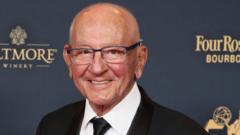Love Island USA has captivated a devoted Nigerian fanbase that engages fervently in the show's drama, social media conversations, and voting strategies, often navigating cultural tensions and misunderstandings with international viewers.
The Unwavering Love of Nigerian Fans for Love Island USA

The Unwavering Love of Nigerian Fans for Love Island USA
Exploring the fervent passion of Nigerian fans for the reality series and the unique cultural dynamics involved.
Committed fans of the reality dating show Love Island USA are eagerly anticipating the reunion of the couples just six weeks post-Fiji finale. Passionate viewers from Nigeria have emerged as a dynamic force within the global fanbase, with many attributing this enthusiasm to both the thrilling on-screen tension and the off-screen drama that often leads to misunderstandings with other international fans. According to 20-year-old Nigerian student Ashimi Olamiposi, “Nigerians love drama; we love 'wahala.'” With the show’s format involving coupling in a luxury villa and public votes, the stakes are high, especially for those invested in their favorite contestants.
Recent controversies saw some Nigerians branded as “toxic,” sparking debates on social media regarding their impact on the voting process and the participants’ social media experiences. Love Island USA, a branch of the popular British format, features contestants - called "islanders" - who navigate challenges and romantic connections under constant surveillance for a shot at the ultimate prize of $100,000 as well as potential love. This season’s winners, Amaya Espinal and Bryan Arenales, are reportedly still together, fueling ongoing conversations among their fans.
Olamiposi reflects on her experience, stating the differences from prior seasons are evident primarily due to the presence of standout islander Huda Mustafa, whose emotive reactions inspired much discussion on social media. This season prompted Olamiposi to join a WhatsApp group formed by fans from the UK and Nigeria, strategizing ways to bypass restrictions that limited voting for those outside the US. The involvement of Nigerians in these fan activities speaks to a broader cultural interest in reality TV, as highlighted by television producer Donald Clarke.
Clarke points out that Nigeria’s storytelling culture has deep roots in its film industry, Nollywood, which spills over into reality TV viewership. “Nigerians are invested,” he explains, noting how interactions on social media amplify conversations around reality shows. Sociologist Dr. Wendy Osefo observes that the love for reality television in Nigeria intertwines with the country’s complex political history, where citizens have often felt like spectators in their political narrative.
Despite the thrilling entertainment, conflicts arise among fans, particularly concerning cultural differences in how identity is perceived. Olamiposi recounts the backlash faced for supporting Mustafa, who is of Arab heritage, a situation that exposed racial tensions among some black viewers. The conversations among fan communities become fierce, with accusations of toxicity labeled against Nigerian participants, prompting calls from some viewers to restrict Nigerian access to the show entirely.
As the fan culture continues to grow, it is marked by a distinct and expressive use of language, reflecting the vibrancy of Nigerian communication. While conflicts unfold online, the passion that drives Nigerian fans remains steadfast. As they prepare for the anticipated reunion episode, Olamiposi urges her fellow fans to “stand on business” - a phrase that has resonated this season - emphasizing authenticity in their discussions and interactions.
With virtual watch parties on the horizon, it’s evident that the enthusiasm for Love Island USA will continue to thrive, woven into the fabric of Nigerian culture, embodying both entertainment and emotional connection amidst a landscape marked by its complexities.




















